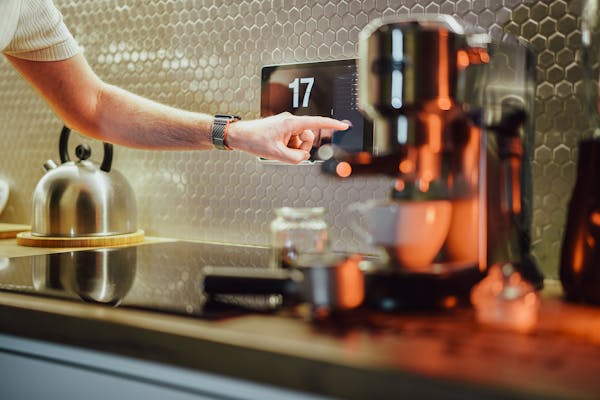How Smart Kitchen Appliances are Revolutionizing the Culinary World
The kitchen has always been the heart of the home, a place where families gather to cook, eat, and connect. Over the past few decades, rapid advancements in technology have fundamentally transformed how we live, work, and play. The kitchen, once dominated by manual processes and traditional appliances, is now at the forefront of this digital transformation. Enter the world of smart kitchen appliances—an evolution in kitchen technology that promises to change the way we interact with our food, simplify cooking, enhance safety, and elevate culinary creativity.
This article delves deep into the fascinating world of kitchen technology, exploring how smart kitchen appliances are reshaping the modern kitchen, making it smarter, more efficient, and incredibly innovative.

The Evolution of Kitchen Technology
Human history has long been intertwined with food preparation. The journey from using open fires for cooking to the gas and electric stoves of the early 20th century was a milestone in technological progress. But as we entered the digital age, the kitchen saw a rapid shift from purely functional spaces to highly integrated hubs of innovation.
In the 21st century, smart kitchen appliances have become the game-changers in how we cook and manage our kitchen activities. The convergence of the Internet of Things (IoT), artificial intelligence (AI), and advanced sensor technologies has led to the creation of devices that not only make cooking easier but also more precise, healthier, and eco-friendly.
What Are Smart Kitchen Appliances?
At their core, smart kitchen appliances are devices that connect to the internet or a local network, offering features that go beyond the traditional role of an appliance. These devices can be controlled remotely via smartphones, voice assistants like Alexa and Google Home, or even through built-in interfaces. The smartness comes from the integration of AI and machine learning, which allows the appliances to adapt to user preferences, automate routine tasks, and offer suggestions based on data insights.
Common examples of smart kitchen appliances include:
- Smart refrigerators that can keep track of food inventory, suggest recipes based on available ingredients, and even place grocery orders.
- Smart ovens that can adjust cooking temperatures automatically, follow pre-set recipes, and be controlled remotely.
- Smart dishwashers that optimize water and energy consumption based on the load size.
- Smart coffee makers that can prepare your favorite brew before you even wake up, thanks to voice command integration.
These devices are not just novelties; they represent a paradigm shift in the way we approach meal preparation and kitchen management.
The Key Benefits of Smart Kitchen Appliances
1. Convenience and Efficiency
Smart kitchen appliances are designed to simplify daily tasks. Imagine being able to preheat your oven while still at the grocery store or having your coffee ready as soon as you walk into the kitchen. Many smart devices allow for remote operation, which means that tasks like defrosting, reheating, and even cooking can be done at the push of a button or voice command.
Many of these appliances also come with scheduling features, so tasks like brewing coffee, preheating ovens, or even starting the dishwasher can be set in advance. This level of automation allows homeowners to save time and plan meals more effectively.
2. Improved Cooking Accuracy
Smart kitchen appliances often come with sensors and AI-powered algorithms that help enhance the precision of cooking. Smart ovens, for instance, can monitor the internal temperature of food and make automatic adjustments to prevent overcooking or undercooking. This technology is especially useful for complex recipes that require specific cooking techniques.
Many smart appliances also come with built-in recipe libraries, offering step-by-step instructions for cooking dishes. With devices like smart sous-vide machines or multi-cookers, users can achieve restaurant-quality results at home with minimal effort.
3. Health and Sustainability
As concerns around healthy eating and sustainable living grow, smart kitchen appliances are helping people make better choices. Smart refrigerators can monitor expiration dates and suggest recipes to reduce food waste. Some appliances are also integrated with health apps, providing insights into caloric intake, nutritional values, and portion control.
Smart appliances also contribute to energy and water efficiency. Smart dishwashers and washing machines use AI to determine the optimal amount of water and electricity needed for each load. Smart refrigerators can shift to energy-saving modes when not in use, reducing overall electricity consumption.
4. Enhanced Connectivity
One of the defining features of smart kitchen appliances is their ability to connect with other devices in the home. Through Wi-Fi or Bluetooth, these appliances can be part of a wider smart home ecosystem, interacting with security systems, lighting, and entertainment. Voice assistants like Amazon Alexa or Google Assistant can easily control many of these appliances, creating a seamless, integrated kitchen experience.
5. Personalization and Adaptation
Thanks to machine learning, many smart kitchen appliances can learn user preferences over time. For instance, a smart coffee maker may adjust brewing times based on when you typically wake up, or a smart oven could suggest recipes based on previous cooking habits. This personalization allows users to get the most out of their appliances while reducing the need for manual adjustments.
Smart Kitchen Appliances Leading the Revolution
1. Smart Refrigerators
One of the most popular smart kitchen appliances, smart refrigerators come equipped with cameras that allow users to see the contents without opening the door. Some can even monitor expiration dates and suggest recipes based on available ingredients. Advanced models have touchscreens that enable grocery list management, meal planning, and even entertainment features like music or video streaming.
Samsung’s Family Hub refrigerator is a prime example, featuring a large touchscreen interface, voice control, and the ability to connect with other smart devices in the home. It can send notifications if the door is left open or when it’s time to replace filters, helping to conserve energy and maintain food quality.
2. Smart Ovens and Cooktops
Smart ovens are designed to take the guesswork out of cooking. These ovens can monitor the internal temperature of dishes, adjust cooking times, and offer step-by-step guidance for a wide range of recipes. Brands like June, Whirlpool, and Bosch have introduced models with built-in AI that can identify different types of food and automatically adjust settings for optimal results.
Additionally, some smart ovens are equipped with camera systems that allow users to monitor cooking progress from their smartphones. This is especially useful when preparing dishes that require precise timing, as users can make adjustments on the fly without having to be in the kitchen.
3. Smart Coffee Makers
Coffee enthusiasts have found a game-changer in smart coffee makers. These devices allow users to control brewing settings via smartphone apps or voice commands. You can schedule your coffee to be brewed at a specific time, select the type of brew, and even adjust the strength of your coffee.
Smart coffee makers from brands like Keurig and Smarter offer these advanced features, providing the perfect cup of coffee every time, even if you’re still in bed.
4. Smart Dishwashers
Smart dishwashers offer several advantages over traditional models, including optimized energy and water usage, remote operation, and diagnostics. These appliances can detect how dirty the dishes are and adjust the water pressure and temperature accordingly. Some smart dishwashers also feature automatic detergent dispensers that release the optimal amount for each load.
Appliances like Bosch’s Home Connect series allow users to control the dishwasher remotely, schedule wash cycles, and receive alerts when the load is complete. In case of any malfunction, the appliance can provide diagnostic information, potentially avoiding costly repair visits.
5. Smart Scales and Nutrition Trackers
For those focused on health, smart scales and nutrition trackers have become indispensable kitchen tools. These devices connect with apps to provide detailed nutritional information about the food being prepared. Some scales can even suggest adjustments to recipes to make them healthier.
Brands like Perfect Company and NutriBullet have developed smart kitchen scales that work with mobile apps to analyze ingredients, track calorie intake, and help users stay on top of their dietary goals.
The Role of AI and IoT in Smart Kitchen Appliances
The integration of AI (Artificial Intelligence) and IoT (Internet of Things) is what truly elevates smart kitchen appliances beyond traditional ones. With IoT, devices can communicate with one another and be controlled remotely. For instance, a smart refrigerator can suggest a recipe, send the recipe to the smart oven, and the oven can then automatically set the correct temperature and cooking time.
AI plays a significant role in adapting these devices to user behavior. Over time, AI learns patterns, such as when users typically cook meals or what types of recipes they prefer. This information allows the appliances to make intelligent recommendations, improving the overall user experience. For example, AI in a smart oven might suggest a quicker cooking time based on user habits or adjust its settings to deliver a perfectly cooked dish every time.
The combination of AI and IoT also enhances safety in the kitchen. Smart stovetops can detect if a burner has been left on and send alerts to the user’s smartphone. Similarly, sensors in ovens can detect smoke or unusual temperature fluctuations and shut down the appliance before it becomes a fire hazard.
Challenges and Considerations for Smart Kitchen Appliances
While smart kitchen appliances offer a range of benefits, they also come with a few challenges and considerations.
1. Cost
Smart kitchen appliances are generally more expensive than their traditional counterparts. While prices are coming down as technology becomes more widespread, the initial investment can still be a significant barrier for some consumers.
However, the long-term savings in terms of energy efficiency and reduced food waste can offset these initial costs over time. Moreover, many consumers see the convenience and time-saving features as a worthwhile trade-off.
2. Security and Privacy Concerns
As with any connected device, security is a major consideration for smart kitchen appliances. Because these devices often connect to home networks and store data about user behavior, they can be vulnerable to hacking or data breaches. Manufacturers are working to improve security protocols, but it’s essential for users to take basic precautions, such as using strong passwords and keeping software up to date.
Privacy concerns are also relevant, especially with appliances that record data or have cameras, like smart refrigerators. Some consumers may be wary of how this data is used or who has access to it.
3. Complexity
For some users, the complexity of smart kitchen appliances can be overwhelming. Learning how to use the various features and understanding the technology might be a steep learning curve, especially for older generations or those unfamiliar with IoT.
Manufacturers are addressing this by improving user interfaces and offering tutorials to help users get the most out of their smart kitchen appliances.
Future Trends in Kitchen Technology
The smart kitchen revolution is still in its early stages, and we can expect even more advanced technology in the years to come.
1. Integration with Wearables and Health Apps
As more people focus on healthy living, there will be increased integration between smart kitchen appliances and wearable health devices. For instance, a smart refrigerator could sync with a fitness tracker to suggest meals that align with the user’s dietary goals, or a smart oven could automatically adjust cooking methods to reduce fat or sodium content.
2. Enhanced Sustainability Features
With growing awareness around environmental impact, future smart kitchen appliances will likely include more advanced sustainability features. This could include better energy-saving modes, the use of recyclable or eco-friendly materials, and even the ability to monitor food waste at a granular level.
3. Virtual Assistants for Meal Planning
We’re already seeing the early stages of virtual assistant integration in the kitchen, but in the future, these systems will become even more intuitive. Imagine a smart assistant that not only suggests recipes based on your food preferences but can also adjust the recipe based on the dietary needs of each family member.
Smart kitchen appliances are more than just a trend—they represent a fundamental shift in how we interact with food and manage our kitchens. As AI and IoT technology continue to evolve, the possibilities for innovation are endless. From improving the convenience and efficiency of meal preparation to reducing food waste and energy consumption, the impact of these devices is profound.
In the years ahead, smart kitchen appliances will likely become an integral part of every household, helping to create healthier, more efficient, and environmentally-friendly kitchens. For those who are passionate about cooking or simply looking to make their lives easier, embracing smart kitchen technology is the next step in the culinary evolution.





